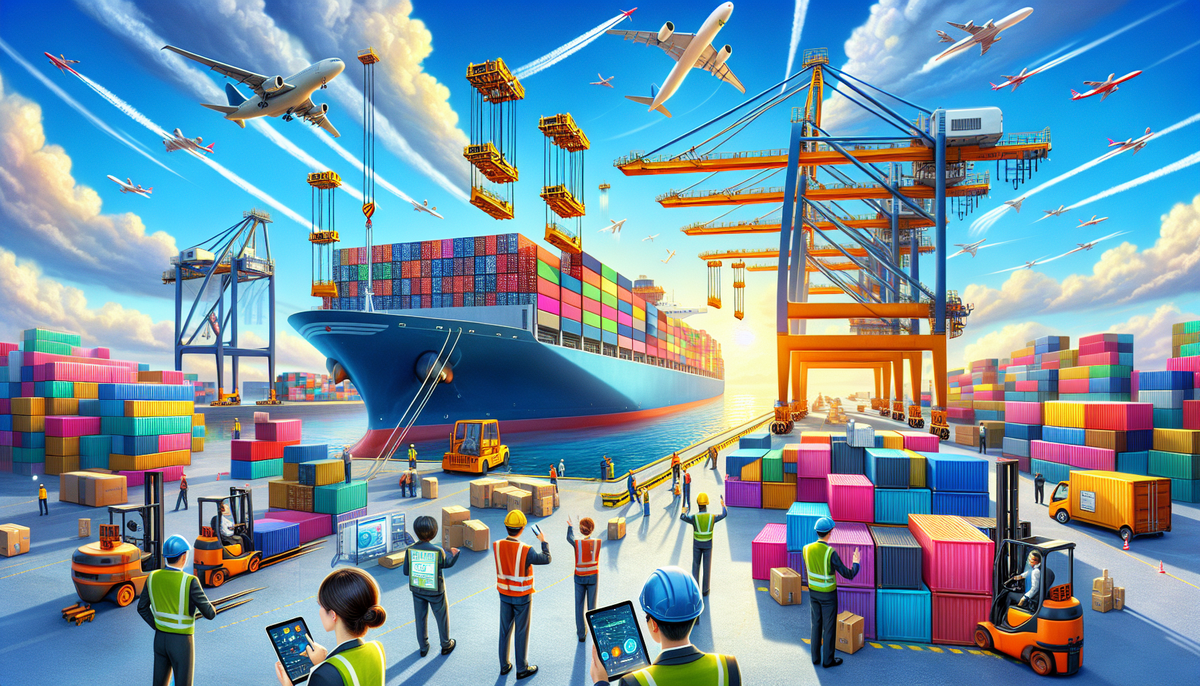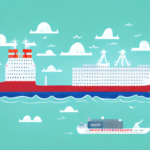Understanding International Shipping
The Basics of International Shipping
As businesses continue to expand their customer base and reach beyond national borders, international shipping has become an increasingly critical aspect of modern commerce. According to the UNCTAD Global Shipping Statistics 2023, international shipping accounts for over 80% of global trade by volume.
International shipping plays a vital role in the global economy, enabling products to be transported around the world efficiently. However, understanding the fundamentals of international shipping is essential to ensure your shipments arrive safely and on time.
The Importance of International Shipping for Businesses
International shipping allows businesses to expand their customer base and tap into new markets, positioning themselves for growth and success. Without international shipping, companies would be confined to local and national markets, significantly limiting their expansion potential.
Additionally, international shipping provides access to a broader range of products and services, enabling businesses to offer their customers a more extensive selection of goods. This diversification can lead to increased customer satisfaction and loyalty.
Moreover, international shipping can help reduce production costs by sourcing materials and products from countries where they are more affordable. This cost-saving strategy enhances competitiveness in the global market and can substantially increase profit margins. According to the Statista Shipping Cost Analysis 2023, businesses that optimize their international shipping strategies can reduce costs by up to 15%.
However, international shipping also presents challenges, including customs regulations, language barriers, and complex logistics. Businesses must be aware of these obstacles and develop robust plans to address them. Partnering with reliable shipping companies, hiring customs brokers, and investing in advanced shipping technologies are effective strategies to overcome these challenges.
Key Factors and Considerations
Key Factors to Consider Before Shipping Internationally
Before embarking on international shipping, several factors must be carefully evaluated:
- Destination Country's Regulations and Customs Requirements: Each country has unique regulations and customs procedures that must be adhered to. Ensuring compliance with all necessary regulations, permits, and licenses is crucial to avoid delays or penalties.
- Transport Mode: Choosing the right mode of transport—air, sea, or ground—depends on the shipment's size, weight, cost, and delivery time requirements. For instance, air freight is faster but more expensive, whereas sea freight is cost-effective for bulk shipments.
- Packaging: Proper packaging is essential to protect goods from damage during transit. International shipping can involve rough handling, so using sturdy and appropriate packaging materials is vital.
- Language and Cultural Barriers: Providing translations for product information and instructions can enhance customer satisfaction. Understanding cultural nuances can also affect how products are received in different markets.
How to Choose the Right Shipping Service for Your Business
Selecting the right shipping service involves evaluating several factors:
- Shipment Size and Weight: Larger and heavier shipments may be more cost-effective via sea freight, while smaller packages might suit air or ground transport.
- Delivery Time: Urgent shipments may require air freight, whereas less time-sensitive goods can utilize sea or ground options.
- Destination Country: Understanding the logistics and infrastructure of the destination country can influence the choice of shipping service.
- Additional Services: Services such as tracking, insurance, and customs clearance assistance can enhance the shipping experience and provide added security.
- Cost: Comparing rates and services from different shipping companies is essential to find the most economical and reliable option. According to the Inbound Logistics Shipping Company Comparison, businesses can save up to 20% by optimizing their shipping provider choices.
Choosing the Best Transport Mode
Selecting the optimal transport mode depends on various factors:
- Size and Weight of Shipment: Larger and heavier shipments are typically more economical via sea freight, while smaller packages may be better suited for air or land transport.
- Delivery Time: Air freight offers the fastest delivery, ideal for urgent or perishable goods. Sea freight, while slower, is more cost-effective for bulk shipments. Ground transportation is suitable for short distances and smaller parcels.
- Nature of Goods: Perishable items require quicker transport methods to maintain freshness, whereas non-perishable goods can be shipped via slower, more economical methods. Hazardous materials may necessitate specialized handling and specific transport modes.
- Destination Country: Infrastructure and logistics capabilities of the destination country can influence the choice of transport mode.
Understanding the specific requirements and regulations associated with each transport mode is essential. For example, certain countries may have restrictions on air freight for specific goods, impacting the overall shipping strategy.
Regulations and Compliance
Understanding Customs and Import/Export Regulations
International shipping requires navigating a complex landscape of customs and import/export regulations:
- Compliance: Each country has specific requirements, including prohibited items, restricted goods, and necessary permits. Non-compliance can lead to shipment delays, fines, or seizure.
- Documentation: Essential documents may include a certificate of origin, commercial invoice, packing list, and, for certain goods, hazardous materials labels.
- Customs Broker Assistance: Partnering with experienced customs brokers or freight forwarders can facilitate smooth customs clearance and ensure adherence to all regulations.
It's crucial to stay updated on the latest regulations, as they can change frequently. Resources like the World Trade Organization Customs Guide provide valuable information on current import/export laws.
Dealing with International Taxes and Duties
Understanding and managing international taxes and duties is a fundamental aspect of international shipping:
- Determining Applicable Taxes and Duties: Each country imposes its own set of taxes and duties on imported goods. Accurately determining these charges is essential to prevent unexpected costs.
- Timely Payment: Ensuring that taxes and duties are paid promptly can prevent shipment delays or rejection by customs authorities.
- Customs Broker Assistance: Working with a customs broker or freight forwarder can help navigate the complexities of international tax regulations and ensure compliance.
Utilize resources like the UK Government Duty and Tax Calculator to estimate and manage these costs effectively.
Shipping Services and Providers
Types of International Shipping Services Available
Businesses have access to various international shipping services, each with its advantages:
- Air Freight: Offers the fastest delivery times, making it ideal for perishable or time-sensitive goods. However, it is generally more expensive compared to other methods.
- Sea Freight: Suitable for large or heavy shipments, sea freight is more cost-effective but comes with longer transit times. It is the preferred option for bulk goods.
- Ground Transportation: Ideal for smaller shipments over short distances, ground transportation is flexible and can complement other shipping modes.
Choosing the appropriate shipping service depends on the nature of the goods. For example, perishable items benefit from air freight to ensure freshness upon arrival, while fragile items may require specialized packaging and handling, influencing the choice of shipping service.
Additionally, some countries impose restrictions on certain goods, such as hazardous materials, which can affect the choice of shipping service and necessitate specific documentation for customs clearance.
How to Find the Right Freight Forwarder for Your International Shipments
Choosing the right freight forwarder is essential for ensuring your international shipments are handled efficiently:
- Experience and Expertise: Select a freight forwarder with extensive experience in your specific type of shipment and a strong understanding of international shipping regulations.
- Reliability and Reputation: Research the freight forwarder's track record for reliability, customer service, and timely deliveries. Testimonials and reviews can provide valuable insights.
- Pricing and Services: Compare pricing structures and assess the range of services offered, including insurance options, tracking capabilities, and customs clearance assistance.
- Global Network: A robust global network can facilitate smoother logistics and more efficient handling of shipments across different regions.
Utilize platforms like the Freightos Freight Forwarder Directory to identify and evaluate potential freight forwarding partners tailored to your business needs.
Managing Costs and Insurance
International Insurance Coverage: Why You Need It and What It Covers
International insurance provides essential protection for your shipments:
- Protection Against Loss or Damage: Insurance coverage safeguards your goods against unforeseen events such as natural disasters, theft, or accidents during transit.
- Customs Clearance Assistance: Some insurance policies include services that aid in navigating customs procedures, ensuring compliance, and expediting clearance.
- Risk Management: Comprehensive insurance can include risk assessment and management services to identify potential vulnerabilities in your shipping process.
- Coverage Variability: Insurance coverage can vary based on the type of goods and destination country. Ensure you work with a reputable provider who understands your specific shipping needs.
Investing in international shipping insurance is a prudent measure to protect your business from unexpected losses and ensure continuity in your operations.
Evaluating the Costs of International Shipping for Your Business
Assessing the true costs of international shipping involves considering multiple factors:
- Transport Mode: Different modes of transport come with varying costs and delivery times. Balancing cost with delivery speed is essential.
- Delivery Time: Faster shipping methods typically incur higher costs. Determine the urgency of your shipments to choose the appropriate balance.
- Insurance Coverage: Including insurance in your shipping costs can protect against potential losses and add to the overall expense.
- Customs Fees: Accurately estimating and budgeting for customs duties and taxes is crucial to avoid unexpected expenses.
- Additional Services: Services such as tracking, special handling, and customs brokerage can add to the total cost but provide added value and security.
Consider both the direct and indirect benefits of expanding your customer base internationally. According to the Statista Global Market Growth Report 2023, businesses that effectively manage their international shipping costs can see a revenue increase of up to 25%.
Partnering with shipping companies that offer competitive pricing and customized solutions can help optimize your international shipping expenses while maximizing the benefits of global market expansion.
As businesses continue to extend their global reach, understanding the nuances of international shipping is essential. By mastering the basics and implementing strategic practices, your business can thrive in the global marketplace, ensuring that your shipments arrive safely and on time.
Best Practices and Challenges
Tips for Packing and Preparing Your Shipment for International Transport
Proper packing and preparation are vital for safe and timely international shipping:
- Use Sturdy Packaging Materials: Ensure that packaging can withstand the rigors of international transit, including handling and environmental changes.
- Include Necessary Documentation: Attach all required labels, permits, and invoices to facilitate customs clearance.
- Secure Your Shipment: Use appropriate sealing methods and secure items within the package to prevent movement and damage during transport.
- Comply with Regulations: Research and adhere to the destination country's customs regulations, including declaring the contents accurately and paying any required taxes or duties.
- Consider Insurance: Purchasing international shipping insurance can provide protection against loss or damage during transit. Review policy terms carefully to ensure adequate coverage.
Tracking Your Shipment: What You Need to Know
Tracking your shipment is crucial for ensuring timely and secure delivery:
- Real-Time Tracking: Most shipping companies provide real-time tracking, allowing businesses and customers to monitor the shipment's progress from origin to destination.
- Coordination: Tracking information facilitates coordination with recipients, ensuring someone is available to receive the shipment upon arrival.
- Issue Resolution: Monitoring tracking updates helps identify and address any delays or issues promptly by contacting the shipping provider.
Be aware that some shipping companies may charge extra for tracking services. Verify with your provider whether tracking is included in your shipping package or incurs additional fees.
Common Challenges of International Shipping and How to Overcome Them
International shipping presents several challenges, including:
- Regulatory Compliance: Navigating diverse regulations requires thorough research and possibly the assistance of experts to ensure compliance.
- Documentation: Managing and preparing all necessary documentation can be time-consuming and complex. Utilizing digital tools and working with experienced partners can streamline this process.
- Logistical Complexities: Coordinating multiple transport modes and managing supply chain logistics demand meticulous planning and reliable partners.
- Cultural Differences: Understanding and respecting cultural nuances can impact how products are received and can influence marketing and sales strategies.
To overcome these challenges, collaborate with experienced and reliable shipping partners who offer comprehensive support and expertise in international logistics.
Best Practices for Managing Your Supply Chain with International Shipping
Effective supply chain management is crucial for successful international shipping:
- Coordination with Suppliers and Partners: Maintain open communication channels with suppliers, shipping partners, and customers to ensure alignment and address any issues promptly.
- Contingency Planning: Develop plans for unforeseen events such as weather-related delays, customs issues, or supply chain disruptions to minimize impact on your business operations.
- Technology Integration: Utilize advanced supply chain management software to enhance visibility, track shipments, and optimize logistics processes.
- Performance Metrics: Establish key performance indicators (KPIs) to monitor and assess the efficiency and reliability of your supply chain operations.
Implementing these best practices can lead to more efficient operations, reduced costs, and improved customer satisfaction.
Conclusion
As businesses continue to extend their global reach, understanding the nuances of international shipping is essential. By mastering the basics and implementing strategic practices, your business can thrive in the global marketplace, ensuring that your shipments arrive safely and on time.






















